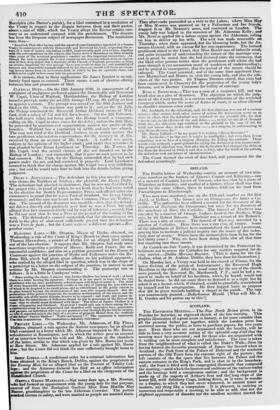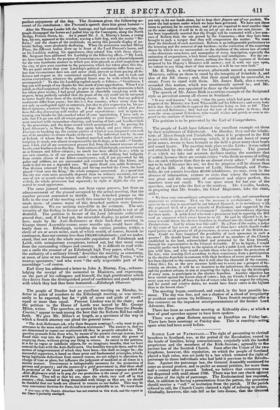SCOTLAND.
THE EDINBURGH MEETING.—The New North Briton gives, in its Number for Saturday, an engraved sketch of the late meeting. This graphic illustration of a great scene in history, is far more valuable than all the pictorial bribes put together, which the London press has scattered among the public, as lures to purchase papers, for two years past. Even those who are not acquainted with the locality, will be able to form a very accurate notion of the splendid coup d'ceil that the meeting must have presented ; and for those who are acquainted with it, nothing can be more complete and satisfactory. The view is taken from the neighbourhood of what is called the Duke's Walk—from its having formed the favourite promenade of James the Second when in. Scotland ; the Park front of the Palace of Holyrood and the southern portion of the Old Town form the extreme right of the picture; the left consists of the flat space that lies between the Palace and the eastern entrance to the King's Park, and is shut in by the boundary-- wall; the front is filled with the congregated thousands that composed the meeting,—amid which the banners and emblems of the various trades and the hustings hold a conspicuous station ; and the background is made up of the majesty of Arthur's Seat and the; long slope of the lower Tell, with Salisbury Crags, looking down, as it were, ID wonder on a display, to which they had never witnessed, in ancient times or modern, any thing like a companion. It is pleasant,. in noticing so numerous and respectable a meeting, to be able to add, that not the slightest appearance of disorder nor the smallest accident marred the perfect enjoyment of the day. The Scotsman gives the following ac- count of its conclusion : the Provost's speech does him great honour— After Sir Thomas Lauder left the hustings, and had entered his carriage, the pwple disengaged the horses and pulled him up the Canongate, along the North -Bridge? Princes Street, &c. As it passed Mr. J. A. Murray's house, a young boy, his son, appeared at the window, waving a little flag, with the motto Re- form ;" and the cheers of the multitude, on seeing this juvenile display of pa- triotic feeling, were absolutely deafening. When the procession reached Moray Place, the different bodies drew up in front of the Lord Provost's house, and on his Lordship making his appearance, they saluted him with three cheers. Mr. Sergeant then addressed his Lordship to the following effect—" My Lord, we have come here for the purpose of returning you our warm acknowledgments for the very handsome manner in which you were pleased, as chief magistrate of the city, to give your sanction to the procession which has taken place this day. We are quite aware that your Lordship's political sentiments differ from ours; but that circumstance does not, and never shall, prevent us froth paying all de- ference and respect to the constituted authority of the land, and to rank and station everywhere, whatever the political biases may be with which they are accompanied." To this his Lordship replied nearly as follows—" Gentlemen, I beg you will accept of my thanks for this mark of your approbation. When I was asked, as chief magistrate of the city, to give my sanction to the procession which has taken place to-day, I had great pleasure in cheerfully complying with the request, being perfectly satisfied that the peaCe of the city could not be intrusted to better hands than those of the working classes. It is true that my political sentiments differ from yours; but this is a free country,. where every man has not only an undisputed right to entertain, but also to give expression to, his po- litical opinions, whatever they may be. I hope the measure which you have been this day discussing will realize all your expectations ; and iu again re- turning you thanks for this marked token of your approbation, I have only to add, that I hope you will all return peaceably to your homes." These remarks were received with tremendous cheering, and waving of hats and handkerchiefs by the procession, and the dense crowd which accompanied it. In passing the Lord Advocate's, iu Moray Place, they again halted, and gave three cheers. Previous to breaking up, the various parties of which it was composed sent each one of its members to return thanks to the rest. The individual sent by the sons of Ireland, of whom four or five hundred marched under their banner, on at- tempting to speak, was almost overpowered by his feelings, as he said—" Gentle- men, I feel, and all my countrymen present feel, from the inmost recesses of our hearts, your kindness to us this day. Noble citizens of Edinburgh, you have treated us as freemen and fellow-citizens ; no insult has been offered to us ; while in our own country, in all our processions, we meet with nothing but indignity from certain classes of our fellow-countrymen; and, if not prevented by the police and soldiers, we are surrounded and escorted by them like felons, and made to feel we are a degraded race. We again thank you, noble Scotsmen." One division returned by the Mound, and having reached the Cross, the band played " God save the King," the whole company uncovered. As a proof that the city was even more peaceably disposed than on ordinary occasions, not one case of riot or assault came befiire the Police next morning. By half-past six o'clock, the whole procession had separated; by eight at night, the city pre- sented its usual appearance.
The same journal estimates, not from vague guesses, but from an admeasurement of the ground occupied by the actual meeting, that the number present amounted to 60,000. The detached groups on the hills in the rear of the meeting swell this number by a good many thou- sands more : of course, many of this detached portion were females and children. We see nothing incredible in the estimate. The uni- versality of the feeling in favour of Reform in Edinburgh is not at all doubtful. The petition in favour of the Lord Advocate sufficiently proved that; and, if it had not, the miserable display, in point of num- bers, made by the Anti-Reformers at their back-door meeting in George Street Assembly-rooms, some months ago, would have effec- tually done so. Edinburgh, including the various parishes within a circle of six or seven miles, each of which would, of course, furnish its contingent, does not contain less than 190,000 inhabitants ; and we under- stand, that not only the whole moveable population of Edinburgh and Leith, with unimportant exceptions, turned out, but that many came from the surrounding villages and country. It is difficult to read with- out a smile the account of an Edinburgh high Tory paper, which, "on the authority of a military friend," describes the meeting as consisting, at most, of nine or ten thousand souls ! reckoning off the Tories, "who went as spectators," and who were "the only respectable part of the • assemblage "—of course.
Earl Grey has addressed a letter to John A. Murray, Esq., acknow- ledging the receipt of the memorial to Ministers, and expressing, on the part of his colleagues and himself, the high gratification which they derive from the distinguished proof of confidence and good opinion with which they had thus been honoured.—Edinburgh Observer.




























 Previous page
Previous page